
Annual Review of Resource Economics
Scope & Guideline
Illuminating the Path to Sustainable Resource Use
Introduction
Aims and Scopes
- Resource and Environmental Economics:
The journal emphasizes the economic analysis of resource use and environmental impacts, exploring how economic policies can be designed to promote sustainable resource management. - Agricultural Economics:
A core area of focus, the journal examines the economic factors influencing agricultural production, food security, and the impacts of agricultural policies on rural development. - Climate Change and Economic Implications:
Research on the economic consequences of climate change, including adaptation and mitigation strategies, has become increasingly prominent, reflecting the urgency of addressing global climate challenges. - Behavioral and Experimental Economics:
The journal incorporates insights from behavioral economics to understand decision-making processes related to resource use and environmental conservation. - Methodological Innovations:
There is a strong emphasis on methodological advancements in economic modeling and empirical analysis, particularly in relation to resource management and environmental policy. - Food Systems and Security:
The journal addresses issues related to food systems, including food loss, insecurity, and the economic implications of food policies.
Trending and Emerging
- Food Insecurity and Policy Effectiveness:
Recent publications indicate a strong emphasis on food insecurity, particularly in the context of policy effectiveness and economic modeling, underscoring the importance of addressing food system vulnerabilities. - Climate Change Adaptation and Mitigation Strategies:
There is an increasing focus on the economic implications of climate change, with research exploring adaptation strategies and the role of economic incentives in promoting sustainable practices. - Interdisciplinary Approaches to Resource Management:
Emerging themes highlight the integration of insights from behavioral economics, environmental science, and public policy, indicating a trend towards more holistic approaches to resource management. - Technological Innovations in Resource Economics:
The rise of discussions around technological advancements, including machine learning and data analytics, suggests a growing interest in how these tools can enhance economic analysis in resource contexts. - Health and Environmental Economics Intersections:
A notable trend is the exploration of the links between health outcomes and environmental policies, reflecting a broader understanding of the socio-economic impacts of environmental issues.
Declining or Waning
- Traditional Agricultural Practices:
Research focused solely on conventional agricultural practices is declining, as the field shifts towards more sustainable and innovative approaches such as agroecology and precision agriculture. - Static Economic Models:
The reliance on traditional, static economic models is waning, with a growing preference for dynamic models that account for changing environmental conditions and economic behaviors. - Single-Dimensional Environmental Policies:
There is a noticeable decline in papers focusing solely on environmental policies without considering their economic implications, as interdisciplinary approaches are gaining traction. - Localized Resource Management Studies:
Studies that only examine local resource management without broader economic contexts or global implications are becoming less common, highlighting the need for integrated approaches. - Overemphasis on Regulatory Frameworks:
The focus on regulatory frameworks in isolation is decreasing, as researchers increasingly explore the interplay between regulation, market mechanisms, and behavioral economics.
Similar Journals
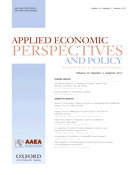
Applied Economic Perspectives and Policy
Unlocking Insights for Effective Development StrategiesApplied Economic Perspectives and Policy is a leading journal published by WILEY, focusing on contemporary issues in economics and development policy. With its commitment to advancing knowledge in these critical fields, the journal boasts an impressive impact factor and consistently ranks in the top quartiles, being categorized as Q1 in both Development and Economics & Econometrics as of 2023. Its Scopus rankings reflect this excellence, placing it at #15 out of 306 in Social Sciences Development and #45 out of 716 in Economics and Econometrics, indicating a prestigious standing within the academic community (95th and 93rd percentiles, respectively). The journal is dedicated to publishing high-quality research that informs policy-making and fosters economic development, inviting submissions that explore innovative solutions to pressing global challenges. As an open-access journal, it ensures widespread visibility and accessibility, encouraging researchers, professionals, and students to engage with the latest findings and contribute to meaningful discussions in the field. With a converged presence from 2010 to 2024, it serves as a vital resource for those looking to stay at the forefront of economic research and policy analysis.
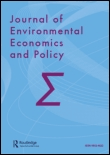
Journal of Environmental Economics and Policy
Shaping Sustainable Futures through Economic DiscourseThe Journal of Environmental Economics and Policy, published by Routledge Journals, Taylor & Francis Ltd, serves as a premier platform for researchers, policymakers, and scholars focused on the interlinkages between environmental issues and economic principles. With an ISSN of 2160-6544 and an E-ISSN of 2160-6552, this esteemed journal has achieved a commendable positioning in the academic community, securing a Q2 rating in key fields such as Economics and Econometrics, Environmental Science, and Management, Monitoring, Policy, and Law as of 2023. The journal has consistently been ranked in the upper tiers of its categories, reflecting its impact and relevance in contemporary environmental discussions. Operating from the United Kingdom, this journal is dedicated to publishing high-quality research articles, reviews, and case studies that contribute to the understanding of economic strategies in environmental governance and policy-making. With an address at 2-4 Park Square, Milton Park, Abingdon OX14 4RN, Oxon, England, it invites contributions that address pressing ecological challenges through an economic lens, fostering an interdisciplinary dialogue crucial for sustainable development. Although not an open access journal, it remains influential in shaping policies and practices that align economic growth with environmental sustainability.
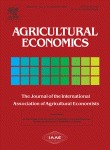
AGRICULTURAL ECONOMICS
Elevating understanding of global agricultural dynamics.AGRICULTURAL ECONOMICS, published by Wiley, is a premier journal dedicated to advancing the understanding of agricultural economics, with an ISSN of 0169-5150 and an E-ISSN of 1574-0862. This esteemed publication serves as a vital resource for researchers, professionals, and students in the fields of Agronomy and Crop Science, as well as Economics and Econometrics, consistently reflecting its high standing as evidenced by its 2023 Q1 ranking in both categories. With a comprehensive scope spanning from 1986 to 2024, the journal presents rigorous analysis and innovative research that informs policy decisions and enhances agricultural practices globally. Although it does not provide open access options, the rich academic content invites a dedicated readership committed to strengthening the agricultural sector through evidence-based insights. The journal is particularly noted for its impressive Scopus rankings, placing it among the top-tier resources for understanding the complex interplay between economic theory and agricultural development.

Indian Journal of Economics and Development
Bridging Theory and Practice in Economics and DevelopmentIndian Journal of Economics and Development, published by SOC ECONOMICS & DEVELOPMENT, stands as a noteworthy platform for scholarly discourse in the fields of economics, business management, and development studies. With an ISSN of 2277-5412 and an E-ISSN of 2322-0430, this journal, based in Ludhiana, India, has been dedicated to advancing research and dialogue since its inception in 2019 and is poised for convergence until 2024. Although currently ranked in the Q4 categories across various disciplines in Business, Management and Accounting, Economics and Econometrics, and Geography, Planning and Development, the journal’s commitment to fostering impactful research is evident in its wide-ranging aims and scope, which seek to explore contemporary economic challenges and developmental issues. While the journal operates without an open-access model, it provides a valuable resource for academics and professionals, and encourages contributions that address both theoretical and empirical questions. Researchers, students, and professionals will find this journal critical as it serves a vital role in the dialogue surrounding economic and developmental dynamics, particularly in an increasingly complex global landscape.
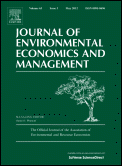
JOURNAL OF ENVIRONMENTAL ECONOMICS AND MANAGEMENT
Pioneering Research for Sustainable Economic Management.JOURNAL OF ENVIRONMENTAL ECONOMICS AND MANAGEMENT, published by Academic Press Inc Elsevier Science, stands as a leading platform for scholarly discourse at the intersection of environmental economics and management. Established in 1974 and continuing through 2024, the journal targets key issues in environmental policy, management strategies, and economic implications of environmental challenges, catering to an extensive audience of researchers, professionals, and students. It boasts a prestigious Q1 ranking in both Economics and Econometrics and Management, Monitoring, Policy and Law for 2023, underscoring its significant contribution to the field. Additionally, with outstanding Scopus rankings—placed in the 88th percentile for Economics and Econometrics and the 82nd percentile for Environmental Science—the journal is recognized for its rigorous peer-reviewed research. Although it follows a subscription model, the insights gained from its comprehensive articles are invaluable for addressing today’s pressing environmental and economic challenges.

Studies in Agricultural Economics
Pioneering Research for Rural Development SolutionsStudies in Agricultural Economics is a premier journal published by AGRARGAZDASAGI KUTATO & INFORMATIKAI INTEZET in Hungary, focusing on innovative research in the interdisciplinary fields of agricultural, biological, and economic sciences. Since becoming an Open Access journal in 1997, it has aimed to enhance the visibility of agricultural economics scholarship while promoting global engagement among researchers, practitioners, and policymakers. With its robust Q2 and Q3 rankings across varied categories including Development and Geography, this journal serves as a significant platform for disseminating cutting-edge studies that address crucial issues in agriculture and rural development. The journal's continuous publication since 2011 until 2024 exemplifies its commitment to providing timely insights into evolving agricultural challenges. With a strong Scopus ranking across multiple domains, particularly in the social sciences and agricultural sectors, it stands as a vital resource for anyone looking to advance knowledge and practice in these critical areas.
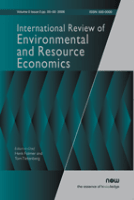
International Review of Environmental and Resource Economics
Cultivating Knowledge for a Sustainable TomorrowThe International Review of Environmental and Resource Economics, published by NOW PUBLISHERS INC, is a leading academic journal dedicated to advancing the understanding of environmental and resource economics. With an ISSN of 1932-1465 and an E-ISSN of 1932-1473, this journal has established itself as a crucial platform for innovative research and discussion in related fields. Covering a broad scope that integrates theoretical frameworks with practical applications, the journal has a distinguished status in the academic community, evidenced by its Q2 ranking in multiple categories including Accounting, Economics and Econometrics, and Finance for 2023. It also maintains a commitment to providing a rich reservoir of knowledge while operating without Open Access constraints, thus promoting rigorous academic exchange among researchers, professionals, and students. The journal's converged years from 2007 to 2024 reflect its ongoing relevance and importance in contemporary economic discourse, particularly in areas concerning management, monitoring, policy, and law pertaining to environmental issues.

ENVIRONMENT AND DEVELOPMENT ECONOMICS
Exploring Innovative Pathways to Sustainable DevelopmentEnvironment and Development Economics, published by Cambridge University Press, stands as a pivotal journal in the fields of development economics and environmental science. With a robust ISSN of 1355-770X and an E-ISSN of 1469-4395, this esteemed publication has been a significant contributor to scholarly discourse since its inception in 1996 and continues to thrive with a convergence of research insights expected to run until 2024. Distinguished by its Q1 status in Development and its Q2 rankings in both Economics and Econometrics and Environmental Science (Miscellaneous) for 2023, the journal reflects its commitment to high-impact research. Notably, it ranks 58th out of 306 in Social Sciences Development and maintains respectable standings in other categories, emphasizing its importance in shaping policies and practices at the intersection of economics and environmental sustainability. Researchers, professionals, and students engaged in these disciplines can access this journal for thought-provoking articles that advance understanding of economic development while addressing environmental challenges.
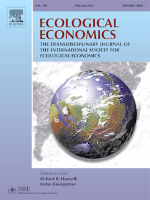
ECOLOGICAL ECONOMICS
Navigating the Complexities of Ecological and Economic Systems.ECOLOGICAL ECONOMICS, published by ELSEVIER, stands as a premier journal dedicated to the integration of ecological and economic thinking, exploring the complex interactions between human and natural systems. With an impactful history dating back to 1989, the journal has solidified its position in the academic community, evidenced by its classification in the top quartiles (Q1) of both Economics and Econometrics and Environmental Science categories for 2023. ECOLOGICAL ECONOMICS boasts impressive Scopus rankings, holding the 32nd position out of 716 in Economics and Econometrics and 19th among 233 in General Environmental Science, reflecting its substantial influence and reach. Although it does not currently offer open access options, the journal remains a vital resource for researchers, professionals, and students interested in sustainable development, environmental policy, and resource management. The ongoing convergence of various fields within ecological economics promises to yield valuable insights and foster interdisciplinary collaboration, making this journal an essential component of scholarly discourse.
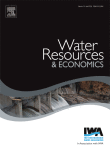
Water Resources and Economics
Advancing Knowledge at the Intersection of Water and Economics.Water Resources and Economics, published by Elsevier, is a prestigious journal that bridges the gap between water resource management and economic theory. With an ISSN of 2212-4284, this journal has been an essential resource in the fields of Economics, Geography, and Water Science since its inception in 2013. Holding a notable Q2 ranking in the 2023 Category Quartiles for Economics and Econometrics, Geography, Planning and Development, and Water Science and Technology, it showcases cutting-edge research that addresses the increasing importance of sustainable water management in a rapidly changing climate. The journal's rigorous peer-review process ensures the dissemination of high-quality studies that influence policy and practice. As it continues to grow within the academic landscape, Water Resources and Economics strives to provide actionable insights and innovative approaches for professionals, researchers, and students invested in the sustainability and economics of water resources. For additional information, please refer to the journal’s website for access and submission guidelines.